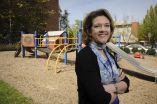Mutant protein takes babies' breath away
Connexin mutation gives insight into how the brain senses blood levels of carbon dioxide, and new hope for premature infants with breathing troubles
2014-11-24
(Press-News.org) Babies start breathing in the womb, inhaling and exhaling irregularly at first, and then gradually more and more, until the day when they're born and have to do it all the time. But premature babies sometimes have trouble. They stop breathing periodically, sometimes for 20 or 30 seconds at a time. Sometimes they're fine, and sometimes they're not, and doctors struggle to help them. That may soon change, however, thanks to a two-month-old patient at UConn Health with a rare connexin mutation, and his doctor's willingness to call for help. The resulting collaboration between physicians and researchers at the University of Connecticut and the University of Warwick demonstrated that astrocytes with that same connexin mutation cannot bind to carbon dioxide. Astrocytes are the most abundant cells in the brain and do many things, including signaling to neurons. If astrocytes in the area of the brain stem that controls breathing had this mutation, they would be oblivious to dangerously high carbon dioxide levels. Doctors believe this explained the baby's disordered breathing. It was also the first time a direct link between the connexin channel, carbon dioxide, and respiration had been shown in humans. The results will be published on 24 November in the journal eLife.
While neurophysiologists were looking at the mutation's effect on human cells, the baby's doctor, UConn Health neonatologist Naveed Hussain, began to review recordings of the breathing patterns of his patient, trying to see if there was anything that could give advance warning of a bad breathing episode. There's not much in the medical literature about the breathing patterns of newborn infants, and Hussain and his colleagues began to wonder if they were even looking at the right things. He invited University of Connecticut physiologist Dan Mulkey and Xinnian Chen, a UConn assistant professor of physiology and neurobiology who specializes in biosignal processing, to examine the recordings.
"They pointed out things we at the hospital hadn't paid any attention to. We invited them to speak at one of our conferences, and that led to a discussion with fellows, and faculty questioning if we maybe could do more with breathing patterns in babies" to help them, Hussain says.
Chen began carefully sifting the data, looking at records of normal breathing, of bad breathing, and most importantly at the recordings taken minutes before the start of a bad breathing episode. She was searching for subtle differences that could serve as warning signs.
What she has found so far has been suggestive. It looks like healthy breathing rhythms are similar to healthy heartbeats. Both of them have slight blips and variations here and there. Heart rhythms have been studied extensively, and cardiologists know that if a heart starts to beat too simplistically regularly, a heart attack is likely in the coming hours. With Hussain's help, the team is gathering recordings of many more premature infants and developing an algorithm that should eventually be able to pinpoint when a baby's breathing pattern goes south.
INFORMATION:
ELSE PRESS RELEASES FROM THIS DATE:
2014-11-24
Repeat suicide attempts and deaths by suicide were roughly 25 percent lower among a group of Danish people who underwent voluntary short-term psychosocial counseling after a suicide attempt, new Johns Hopkins Bloomberg School of Public Health-led research suggests.
The findings are believed to be the first to show that talk therapy-focused suicide prevention actually works, averting future suicide attempts in this very high-risk population. Although just six-to-ten talk therapy sessions were provided, researchers found long-term benefits: Five years after the counseling ...
2014-11-24
Over a million US military veterans lacked healthcare coverage in 2012, according to new estimates published in The Lancet. While many people believe that all veterans are covered by the Veterans Affairs health care system, less than half (8.9 million) of the 22 million veterans in the US are covered by VA health benefits, and most veterans are covered by private health insurance. Uninsured veterans are more likely to be young, single, African American, and veterans of Iraq and Afghanistan.
However, the authors of this viewpoint estimate that universal health coverage ...
2014-11-21
Changes to the structure of the protein histone H3.3 may play a key role in silencing genes that regulate cancer cell growth, according to a study led by researchers from the Icahn School of Medicine at Mount Sinai and published online this month in the journal Nature Communications. According to the authors, this is the first study to identify this protein as a key regulator in cellular senescence, a process in which cells stop multiplying.
Cellular senescence has garnered significant scientific interest of late because it may be one key to prevent the initiation ...
2014-11-21
COLUMBUS, Ohio - Doubling or even nearly tripling saturated fat in the diet does not drive up total levels of saturated fat in the blood, according to a controlled diet study.
However, increasing levels of carbohydrates in the diet during the study promoted a steady increase in the blood of a fatty acid linked to an elevated risk for diabetes and heart disease.
The finding "challenges the conventional wisdom that has demonized saturated fat and extends our knowledge of why dietary saturated fat doesn't correlate with disease," said senior author Jeff Volek, a professor ...
2014-11-21
CHAMPAIGN, Ill. -- Women with symptoms of serious mental illness are significantly less likely to receive three routine cancer screenings - Pap tests, mammograms and clinical breast exams - than women in the general population, despite being at elevated risk for medical comorbidities and early death, a new study indicates.
Women who reported symptoms of serious psychological distress - such as feelings of hopelessness and depression - during the past 30 days were 41 percent less likely to have received Pap tests during the preceding two-year period, University of Illinois ...
2014-11-21
Research published today found that the investigational drug patiromer decreased high potassium levels and maintained normal potassium levels in patients with chronic kidney disease. The results of a multicenter trial appear in the New England Journal of Medicine.
Elevated potassium, a condition called hyperkalemia, increases the risk of death in high-risk patients and limits the use of several types of drugs, called RAAS (renin-angiotensin-aldosterone system) inhibitors, commonly used to control hypertension and cardiovascular disease and prevent kidney disorders.
"Patients ...
2014-11-21
The exclusive club of explorers who have discovered a rare new species of life isn't restricted to globetrotters traveling to remote locations like the Amazon rainforests, Madagascar or the woodlands of the Congo River basin. Just ask professor John Nelson and alumnus Douglas Rayner -- they're having their membership cards stamped with a long-hidden plant found nowhere but South Carolina.
The new species, dubbed Stachys caroliniana, makes its debut on the international botanical stage next week with a peer-reviewed publication describing its unique characteristics. It ...
2014-11-21
A study by a Wayne State University and Children's Hospital of Michigan, Detroit Medical Center research team is shedding new light on the troubling question of whether the drugs often given to HIV-positive pregnant women can cause significant long-term heart problems for the non-HIV-infected babies they carry.
The study recently published in the journal AIDS shows that while the HIV medications have been successful in helping to prevent the transmission of the virus from mother to infant, they are associated with persistently impaired development of heart muscle and ...
2014-11-21
An intervention that uses music and games to help preschoolers learn self-regulation skills is helping prepare at-risk children for kindergarten, a new study from Oregon State University shows.
Self-regulation skills - the skills that help children pay attention, follow directions, stay on task and persist through difficulty - are critical to a child's success in kindergarten and beyond, said OSU's Megan McClelland, a nationally recognized expert in child development and a co-author of the new study.
"Most children do just fine in the transition to kindergarten, but ...
2014-11-21
We are all familiar with the hassles that accompany air travel. We shuffle through long lines, remove our shoes, and carry liquids in regulation-sized tubes. And even after all the effort, we still wonder if these procedures are making us any safer. Now a new type of security detection that uses terahertz radiation is looking to prove its promise. Able to detect explosives, chemical agents, and dangerous biological substances from safe distances, devices using terahertz waves could make public spaces more secure than ever.
But current terahertz sources are large, multi-component ...
LAST 30 PRESS RELEASES:
[Press-News.org] Mutant protein takes babies' breath away
Connexin mutation gives insight into how the brain senses blood levels of carbon dioxide, and new hope for premature infants with breathing troubles


